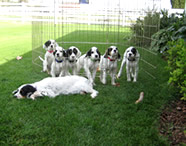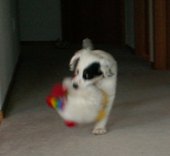 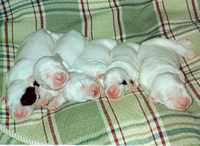
Rock
Llewellin Setters does everything it can to ensure that it is breeding responsibly. No dog is bred by us that would knowingly contribute unwanted
traits in health, hunting ability, temperament, and conformation to
the breed--we look critically at all traits in each of our dogs and do research into each familial history as well. RLS breeding dogs must be up to date with all vet care and
in excellent physical shape. The Llewellins are all FDSB registered, microchipped, DNA tested, and OFA Hip certified. As of 2013, all breeding dogs will also be OFA Elbow, Eyes, and Thyroid certified. We believe that, because we have facilitated the breedings, we are responsible for each of the puppies'
lives and will do everything possible for them. We raise our
puppies how we would like each of our own dogs to be raised, and dedicated
care, love, and knowledge are put into each litters. In addition, we are constantly trying to learn more and find new ways to do things that might further benefit our program and pups.

Post-Breeding
RLS bred females, although still allowed to work and play,
are handled with great care. Their lives remain unchanged through 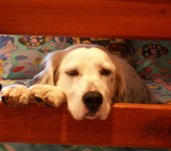 about
the first half of the pregnancy. Then, their nutritional needs alter, so we change their diet regimens. The number of meals
and the total daily intake are increased, the feedings are indoors and
supervised, and extra nutrients/variety are added to the high-quality food.
Expecting dams sleep indoors with
the family to be monitered extra closely. If there are any concerns about the upcoming delivery, the
dam will be checked or ultrasounded by a veterinarian. about
the first half of the pregnancy. Then, their nutritional needs alter, so we change their diet regimens. The number of meals
and the total daily intake are increased, the feedings are indoors and
supervised, and extra nutrients/variety are added to the high-quality food.
Expecting dams sleep indoors with
the family to be monitered extra closely. If there are any concerns about the upcoming delivery, the
dam will be checked or ultrasounded by a veterinarian.
Whelping
When
the time comes for the delivery, the dam is moved to the whelping room.
During the delivery the dam is accompanied by Chelsea and another to assist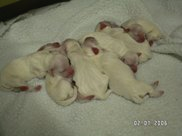 . After
each birth, the puppies' cords get clamped, cut, and treated, and after we make sure their airways are clear, we let the dam get them cleaned up. We check over the pups for cleft palates and other possible defects that could be life-threatening and make sure they all take to nursing well. Observations of the initial conditions and weights of the puppies are recorded
in their individual puppy journals, which we use for record, health, and program tracking purposes. The handling we do at birth is just the start of the
puppies' ongoing socialization they will receive while with us since it is one of the most important things a breeder can do to ensure their pups grow into friendly, confident, outgoing dogs. Note: we do not remove front dew claws: tightly-formed and attached [by bone] dew claws are most likely functional for agility/mobility and have minimal risk of injury in the field. . After
each birth, the puppies' cords get clamped, cut, and treated, and after we make sure their airways are clear, we let the dam get them cleaned up. We check over the pups for cleft palates and other possible defects that could be life-threatening and make sure they all take to nursing well. Observations of the initial conditions and weights of the puppies are recorded
in their individual puppy journals, which we use for record, health, and program tracking purposes. The handling we do at birth is just the start of the
puppies' ongoing socialization they will receive while with us since it is one of the most important things a breeder can do to ensure their pups grow into friendly, confident, outgoing dogs. Note: we do not remove front dew claws: tightly-formed and attached [by bone] dew claws are most likely functional for agility/mobility and have minimal risk of injury in the field.
First
Few Weeks
For the first two weeks, the litter and dam are under observation
twenty-four 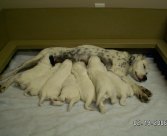 hours a day. They have frequent human contact and are also
examined closely daily. Because most neonatal deaths occur due to chill, we also take care to maintain a comfortable temperature in the whelping box/room, through heater/AC and a Lectro-Kennel heating pad. To ensure a clean environment, we change the bedding in the whelping box several times a day and also sanitize the box at least weekly. (Both our constant supervision and custom layering system for the bedding, allow for exceptional cleanliness of the box and safety from smothering.) hours a day. They have frequent human contact and are also
examined closely daily. Because most neonatal deaths occur due to chill, we also take care to maintain a comfortable temperature in the whelping box/room, through heater/AC and a Lectro-Kennel heating pad. To ensure a clean environment, we change the bedding in the whelping box several times a day and also sanitize the box at least weekly. (Both our constant supervision and custom layering system for the bedding, allow for exceptional cleanliness of the box and safety from smothering.)
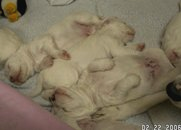 From days three to sixteen, pups go through the SuperDog/Bio
Sensor Method, which is a neurological development
stimulation method; when done correctly and carefully, studies have shown it has the
benefits of improved cardiovascular performance, stronger heart beats,
stronger adrenal glands, higher stress tolerance, and greater resistance
to disease. [Update 2014: We need to update our research on this program, as, during a recent canine conference, it was mentioned scientists now believe it was the maternal comforting post-stress was likely the beneficial factor at play during those early studies.] Regardless, handling in a variety of ways will likely continue. We also play a TV or radio in their room. From days three to sixteen, pups go through the SuperDog/Bio
Sensor Method, which is a neurological development
stimulation method; when done correctly and carefully, studies have shown it has the
benefits of improved cardiovascular performance, stronger heart beats,
stronger adrenal glands, higher stress tolerance, and greater resistance
to disease. [Update 2014: We need to update our research on this program, as, during a recent canine conference, it was mentioned scientists now believe it was the maternal comforting post-stress was likely the beneficial factor at play during those early studies.] Regardless, handling in a variety of ways will likely continue. We also play a TV or radio in their room.
Towards the end of the second week, the pups will start being brought into the house with
their dam for a couple of hours or so, mostly to give the dam a break. When the pups' eyes open and they start moving around, we provide them with a variety of toys and obstacles to investigate and play with in their whelping box/play area. Weather and condition permitting, the
third-fourth weeks bring the puppies' introduction to the outside world. Though
they still spend the majority of their time inside the whelping room at this age,
the puppies' length of time playing and exploring in the yard increases, as well time in the house together and individually.
They are still supervised constantly, and as a result, are handled,
talked to, and played with a lot.
Socialization
and Weaning
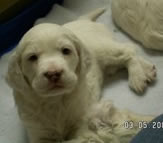 We try to provide our litters with as much positive mental, social, and physical stimulation as possible or beneficial. By
the fourth week, RLS puppies are very active and playful. They have
distinguishable characters and are responding and interacting with their
environment. Through the fourth to eighth
weeks, most of the puppies' time is spent playing in
the puppy yard pens, exploring the property, or getting accustomed to life in our home. Lots of toys, objects/obstacles, and people keep them busy wherever they are. In addition, they have the company of the adult dogs who are playing in the yard and the supervision of their dam who can go in/out of their pen. The pups get to play and explore around the yard, shop/kennel, and garden areas whenever someone is capable of closely supervising (multiple times daily). In the evenings, the puppies enjoy their time spent
playing in the house or shop with us, while at the same time experiencing the sounds, textures, and sights that come with the territory. We try to provide our litters with as much positive mental, social, and physical stimulation as possible or beneficial. By
the fourth week, RLS puppies are very active and playful. They have
distinguishable characters and are responding and interacting with their
environment. Through the fourth to eighth
weeks, most of the puppies' time is spent playing in
the puppy yard pens, exploring the property, or getting accustomed to life in our home. Lots of toys, objects/obstacles, and people keep them busy wherever they are. In addition, they have the company of the adult dogs who are playing in the yard and the supervision of their dam who can go in/out of their pen. The pups get to play and explore around the yard, shop/kennel, and garden areas whenever someone is capable of closely supervising (multiple times daily). In the evenings, the puppies enjoy their time spent
playing in the house or shop with us, while at the same time experiencing the sounds, textures, and sights that come with the territory. 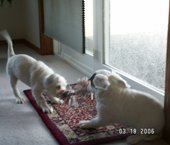 When the pups are around six-seven weeks old, weather permitting,they will be moved out of the whelping room and into a puppy-proofed kennel for daytime containment when we aren't home to watch them. They will start spending nights in the puppy kennel when they are seven-eight weeks old, depending on the weather and weaning stage. For as long as the pups are kept in the whelping room, we keep the concrete floors picked up and clean throughout the day, and mop/sanitize them at least twice a day, allowing for drying/airing out time before letting the pups back in. When the pups are around six-seven weeks old, weather permitting,they will be moved out of the whelping room and into a puppy-proofed kennel for daytime containment when we aren't home to watch them. They will start spending nights in the puppy kennel when they are seven-eight weeks old, depending on the weather and weaning stage. For as long as the pups are kept in the whelping room, we keep the concrete floors picked up and clean throughout the day, and mop/sanitize them at least twice a day, allowing for drying/airing out time before letting the pups back in.
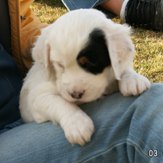 Because socialization is
very important, the puppies are introduced carefully and positively to other dogs, puppies, cats,
horses, cows, birds, cars, dirtbikes, tractors, etc.... We try to get as many friendly people (toddlers, kids, and adults) as we can to come play with the pups; however, care is taken to avoid negative experiences or introduction
to people or animals who have a high risk of carrying diseases or parasites. Socialization isn't just about dog-dog or dog-people interaction! The puppies
are also exposed to everyday family-life, its objects/appliances, sounds, textures, and more. Because socialization is
very important, the puppies are introduced carefully and positively to other dogs, puppies, cats,
horses, cows, birds, cars, dirtbikes, tractors, etc.... We try to get as many friendly people (toddlers, kids, and adults) as we can to come play with the pups; however, care is taken to avoid negative experiences or introduction
to people or animals who have a high risk of carrying diseases or parasites. Socialization isn't just about dog-dog or dog-people interaction! The puppies
are also exposed to everyday family-life, its objects/appliances, sounds, textures, and more.
At
five weeks, the puppies start wearing their puppy check cords, which
are just long enough to trail behind them and allow a game of puppy
tug-o-war. This puppy play with the cords allows the puppies to become
familiar and comfortable with handling and respond to pressure/release. For the last week they're here, they'll start wearing puppy collars with short 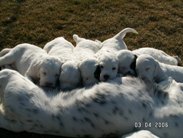 cords. While we let the dam really determine the beginning of weaning, the general process proceeds at five weeks, starting the pups off
on a mix of ground puppy food and puppy formula. It takes about three weeks
to fully wean the puppies off of the milkbar, since the dam is sometimes willing to periodically nurse even large puppies. By seven
or eight weeks the litters will be eating dry puppy food, mixed with
quality canned food if needed. cords. While we let the dam really determine the beginning of weaning, the general process proceeds at five weeks, starting the pups off
on a mix of ground puppy food and puppy formula. It takes about three weeks
to fully wean the puppies off of the milkbar, since the dam is sometimes willing to periodically nurse even large puppies. By seven
or eight weeks the litters will be eating dry puppy food, mixed with
quality canned food if needed.
Grooming,
Health Care, and Further Socialization
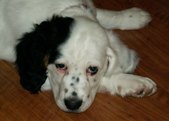 The
puppies' first fun grooming session introductions at RLS are at six weeks, when the pups
have their first bath, gentle ear cleaning, and brushing. They'll have had their nails trimmed since they were a couple weeks
old. The
puppies' first fun grooming session introductions at RLS are at six weeks, when the pups
have their first bath, gentle ear cleaning, and brushing. They'll have had their nails trimmed since they were a couple weeks
old.
The first trip to the vet clinic is at six-seven weeks for their initial vaccinations and exam (see note above, we do not remove dewclaws). As of 2006, the AAHA now recommends a series of three doses of the core vaccinations to be administered between the ages of 6 and 16 weeks, at intervals of 3-4weeks, with the last dose between 14-16 weeks; depending on when we start the series, we may or may not give the second vaccination ourselves by 9 weeks of age. However if the pups remain with us past that age,we will continue and finish the vaccination regimen. Puppies are dewormed at 2, 3, 4, 6, 8, and 12 weeks of age with a double strength pyrantel pamoate wormer. All puppies will also be microchipped before leaving RLS.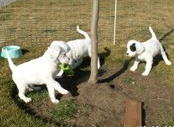
Once
the litter gets started on the vaccinations, RLS will consider taking the pups individually to a nearby city where they can get more experience with stores, strangers, and traffic; if they're older, they may even get to go to a motocross track or the mountains/trails.
They'll also be taken to visit family where they can explore new houses and meet other pets. Every place the puppies go to have positive experiences expands their world and helps to make them
more confident.
Early
Training
The training of the puppies begins as early as four weeks,
but is slow, fun, and undemanding. Throughout their time with us, the
puppies will receive a good introduction on basic things like recall, sit, lay down,
stand, kennel, retrieve, out, and leash walking through marker training. Because the pups are often in the house,
their housebreaking is started through crate training. Whoa will also be introduced with marker training. They get to point a wing at five weeks old to wake up that instinct and are later introduced to quail or pigeon for some real bird fun. We also get them playing in a dog pool and may take them to small bodies of water. During their last couple weeks (7-9) with us, we begin taking them to some fields to let them explore as small groups and/or with an adult dog.
RLS believes starting fun work in the field environments helps to develop
an excellent bird dog.
As long as the puppies are at RLS, their training
will progress.
Top |


 about
the first half of the pregnancy. Then, their nutritional needs alter, so we change their diet regimens. The number of meals
and the total daily intake are increased, the feedings are indoors and
supervised, and extra nutrients/variety are added to the high-quality food.
Expecting dams sleep indoors with
the family to be monitered extra closely. If there are any concerns about the upcoming delivery, the
dam will be checked or ultrasounded by a veterinarian.
about
the first half of the pregnancy. Then, their nutritional needs alter, so we change their diet regimens. The number of meals
and the total daily intake are increased, the feedings are indoors and
supervised, and extra nutrients/variety are added to the high-quality food.
Expecting dams sleep indoors with
the family to be monitered extra closely. If there are any concerns about the upcoming delivery, the
dam will be checked or ultrasounded by a veterinarian. . After
each birth, the puppies' cords get clamped, cut, and treated, and after we make sure their airways are clear, we let the dam get them cleaned up. We check over the pups for cleft palates and other possible defects that could be life-threatening and make sure they all take to nursing well. Observations of the initial conditions and weights of the puppies are recorded
in their individual puppy journals, which we use for record, health, and program tracking purposes. The handling we do at birth is just the start of the
puppies' ongoing socialization they will receive while with us since it is one of the most important things a breeder can do to ensure their pups grow into friendly, confident, outgoing dogs. Note: we do not remove front dew claws: tightly-formed and attached [by bone] dew claws are most likely
. After
each birth, the puppies' cords get clamped, cut, and treated, and after we make sure their airways are clear, we let the dam get them cleaned up. We check over the pups for cleft palates and other possible defects that could be life-threatening and make sure they all take to nursing well. Observations of the initial conditions and weights of the puppies are recorded
in their individual puppy journals, which we use for record, health, and program tracking purposes. The handling we do at birth is just the start of the
puppies' ongoing socialization they will receive while with us since it is one of the most important things a breeder can do to ensure their pups grow into friendly, confident, outgoing dogs. Note: we do not remove front dew claws: tightly-formed and attached [by bone] dew claws are most likely  hours a day. They have frequent human contact and are also
examined closely daily. Because most neonatal deaths occur due to chill, we also take care to maintain a comfortable temperature in the whelping box/room, through heater/AC and a Lectro-Kennel heating pad. To ensure a clean environment, we change the bedding in the whelping box several times a day and also sanitize the box at least weekly. (Both our constant supervision and custom layering system for the bedding, allow for exceptional cleanliness of the box and safety from smothering.)
hours a day. They have frequent human contact and are also
examined closely daily. Because most neonatal deaths occur due to chill, we also take care to maintain a comfortable temperature in the whelping box/room, through heater/AC and a Lectro-Kennel heating pad. To ensure a clean environment, we change the bedding in the whelping box several times a day and also sanitize the box at least weekly. (Both our constant supervision and custom layering system for the bedding, allow for exceptional cleanliness of the box and safety from smothering.)

 When the pups are around six-seven weeks old, weather permitting,they will be moved out of the whelping room and into a puppy-proofed kennel for daytime containment when we aren't home to watch them. They will start spending nights in the puppy kennel when they are seven-eight weeks old, depending on the weather and weaning stage. For as long as the pups are kept in the whelping room, we keep the concrete floors picked up and clean throughout the day, and mop/sanitize them at least twice a day, allowing for drying/airing out time before letting the pups back in.
When the pups are around six-seven weeks old, weather permitting,they will be moved out of the whelping room and into a puppy-proofed kennel for daytime containment when we aren't home to watch them. They will start spending nights in the puppy kennel when they are seven-eight weeks old, depending on the weather and weaning stage. For as long as the pups are kept in the whelping room, we keep the concrete floors picked up and clean throughout the day, and mop/sanitize them at least twice a day, allowing for drying/airing out time before letting the pups back in.
 cords. While we let the dam really determine the beginning of weaning, the general process proceeds at five weeks, starting the pups off
on a mix of ground puppy food and puppy formula. It takes about three weeks
to fully wean the puppies off of the milkbar, since the dam is sometimes willing to periodically nurse even large puppies. By seven
or eight weeks the litters will be eating dry puppy food, mixed with
quality canned food if needed.
cords. While we let the dam really determine the beginning of weaning, the general process proceeds at five weeks, starting the pups off
on a mix of ground puppy food and puppy formula. It takes about three weeks
to fully wean the puppies off of the milkbar, since the dam is sometimes willing to periodically nurse even large puppies. By seven
or eight weeks the litters will be eating dry puppy food, mixed with
quality canned food if needed.  The
puppies' first fun grooming session introductions at RLS are at six weeks, when the pups
have their first bath, gentle ear cleaning, and brushing. They'll have had their nails trimmed since they were a couple weeks
old.
The
puppies' first fun grooming session introductions at RLS are at six weeks, when the pups
have their first bath, gentle ear cleaning, and brushing. They'll have had their nails trimmed since they were a couple weeks
old.
